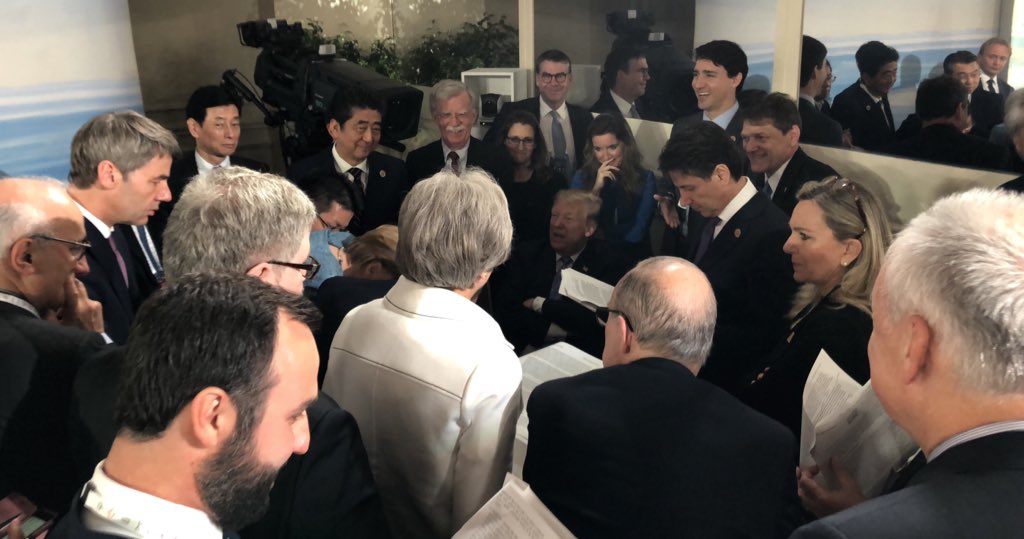A picture is worth a thousand words, or even two thousand, but for a better insight into what occurred at the G7 Summit in Canada and what it means for Europe, please read on.
The build-up
“Against all odds, European unity actually held throughout the G7 summit”.
Donald Trump is a person who is utterly disliked in Germany, and many there are starting to think that he is not just an accident but rather the embodiment of a more inward-looking, illiberal and reactionary US. The G7 in Canada has only confirmed the impression. For most Germans this is tough because their relationship to the US is very emotionally charged, as reported by Susan B Glasser. The link is a bit like that of a father with a son, with the former becoming dysfunctional and reneging on his duty to protect the latter. This has led many German officials to start considering a plan B. Germany needs to develop a foreign policy independently from the US and closer to its European allies, especially France. But that would be a long-term strategy.
For now, Germany, and the other European countries, are fully aware of their strategic weaknesses and that is the reason they have tried to engage positively with Trump. However, things started to unravel in March 2018 when Trump dismissed Gary Cohn and substituted him by Larry Kudlow as Chief Economic Advisor. Together with Peter Navarro as Director of the National Trade Council, Wilbur Ross as Commerce Secretary and Mike Pompeo as Secretary of States, and with John Bolton in National Security, these are all hardliners who believe in Trump’s ‘America First’ logic and are unlikely to speak up against the President. The only globalist is Steven Mnuchin, the Secretary of the Treasury, but he is relatively weak.
Zweiter Tag des #G7-Gipfels in Kanada: Beratungen am Rande der offiziellen Tagesordnung #G7Charlevoix pic.twitter.com/5GiGF6zTHr— Steffen Seibert (@RegSprecher) 9 de junio de 2018
John Bolton is of particular concern because he is behind the idea of imposing import tariffs on national security grounds. As the President of the European Council, Donald Tusk, put it, ‘if you have friends like this, who needs enemies?’. Many in Europe believed that Trump’s strategy was to apply tariffs to China but not to the EU and other allies. Officials in Brussels discreetly recognised that they did not like Trump’s bullish methods but that if it could make China open up and liberalise its market further, ultimately not hurting Europe, they would be content. But that has not been the case. Trump decided to apply tariffs on European and Canadian steel and aluminium only a couple of weeks before the G7 meeting in Canada.
No wonder then that the days before the meeting were tense. After trying to be understanding with Trump for so long, the G6 leaders said they would tell Trump face-to-face of their discontent with his actions. As usual, the Europeans knew that the only way to be firm with Trump was to present a united front. For that purpose, they held a meeting a few hours before the summit. The idea was to coordinate themselves and devise a joint position. Present at the meeting were Angela Merkel, Emmanuel Macron, Theresa May, Jean-Claude Juncker, Donald Tusk and also the newly-elected Italian Prime Minister, Giuseppe Conte, who hours before had backed-up Trump via Tweet saying that Russia should be re-admitted to the G7.
Many believed this to be a master stroke by Trump, taking advantage of the new Italian Government’s softer stance on Russia, to divide the Europeans. But the effect was otherwise. It is not clear whether Conte changed his mind at the meeting or later, but the fact was that European coordination worked and Conte corrected himself by saying that he meant that Russia should be apart of the G7 but only after altered its policy in Ukraine.
Against all odds, European unity actually held throughout the G7 summit. Perhaps it helped that during the Europeans’ coordination meeting, Trump arrived by helicopter and the deafening noise prevented any sort of conversation. The message was clear: here comes the chest-beating American; there are few things that quite unite the Europeans more than that.
The row
The G7 meeting has been one of the most disastrous in years. Trump’s attitude throughout the summit was condescending and arrogant. Until only a few days before the gathering it was not even clear whether he would attend, displaying a significant lack of respect to the Canadian hosts. He was the last to arrive and the first to leave and he was tactless on many occasions. He announced he would not attend the second part of the second day, covering issues related to climate change, development and the reduction of plastic waste in ocean and seas. On Friday he accosted all the leaders at the table telling them how and why their countries were taking advantage of the US. The G6 leaders argued back but Trump was totally undeterred. Macron felt encouraged to give Trump a lesson in economics in an attempt to explain why free trade entails a great benefit while a trade war would be detrimental even to US farmers and workers.
In Europe the feeling is that the US is trying to destroy the WTO. The Europeans agree that it might need to be revised and improved but, talking with Trump and other top US economic officials, their impression is that the US that is just not enough. Trump wants to go to a pure power-based international system with few rules. His proposal of creating a tariff free zone for all G7 countries is interpreted in this light. From a European point of view there is no free trade without rules and regulations. What Trump proposes, however, sounds more like the survival of the fittest and the law of the jungle. The language that he used against Germany and the EU points in that direction. Apparently, he was especially harsh with the EU Competition Commissioner Margrethe Vestager (who has taken on big US companies like Apple and Google), who he called the ‘tax lady’ who ‘hates the US’.
While Friday was tough, Saturday was even tougher. Trump arrived more than 15 minutes late to the breakfast session devoted to gender equality, which angered the IMF Chief Christine Lagarde, who was chairing the meeting. Neither did he deign to appear in the final G7 picture with the outreach leaders. His mind was already on Singapore where three days later (in fact, he could have stayed on until the end of the Charlevoix summit had he wished to) he was to meet North Korea’s Kim Jong-Un. Trump departed after a headline-filled press conference. He blustered that the US was being treated like a piggybank that everyone was plundering, that it had to end and that if other countries raised their trade tariffs on the US he would be willing to close off the US market wholesale. On a kinder note, he did say that he was happy to sign the joint communiqué after such difficult negotiations, almost as a gesture of goodwill, to show that he was a reasonable man.
“The debate in Europe will continue to be whether Trump is just a blip (…) or whether there has been a permanent and structural shift in US foreign policy”.
However, the positive mood was not to last. Justin Trudeau explained at his press conference that Canada would retaliate against tariffs imposed by the US because Canadians were an agreeable and friendly people but would not be pushed around. Trump, already on board Air Force One, became so annoyed that he began a tweetstorm against the Canadian Prime Minister. He immediately said the US would now refuse to sign the joint communiqué and that he was ready for any impending trade war even with tariffs on imported cars if need be. More shocking still was Peter Navarro’s justification for Trump’s reaction: Trudeau’s words (‘Canadians will not be pushed around’) made him look weak only days before the historic meeting with Kim Jong-un; that was unacceptable to Trump, prompting him to lash out at the Canadian leader and the rest of the G-6 to boot. Navarro further claimed there was ‘a special place in hell’ for someone like Trudeau, capable of stabbing Trump in the back. From a European perspective, such a tantrum is simply further evidence of the US President acting like a spoilt child.
The future
The debate in Europe will continue to be whether Trump is just a blip, with the White House returning to the good old Western alliance once he departs, or whether there has been a permanent and structural shift in US foreign policy. Those who still hope for the best have been disappointed by so few congressmen and senators –save exceptions like Senator John McCain– criticising Trump. The penny is slowly dropping and, given Trump’s overtures to Putin and Russia, European leaders are increasingly coming to think that the US might cease to be a reliable partner, even in places like Poland where many first cheered Trump on but now fear his intentions may not live up to their expectations. Sources on the ground indicate that when it became known in Warsaw that Trump wanted to re-invite Russia to the G7, the silence among policymakers became deafening.
In any case, the truth is that Europe is still highly reliant on the US for its security and prosperity. In a tit-for-tat trade war the EU would have much more to lose because it is a more open economy. Militarily, it is also highly vulnerable: true, the UK and France are nuclear powers but, as shown by the war in Syria, their hitting power is very limited. Without US support they would be incapable of holding back a potential Russian attack. Nonetheless, it is true that a more aggressive Russia, Brexit, Trump and the rise of China have started to change some perceptions. Slowly but steadily, the EU –especially the core countries comprising the Eurozone– are beginning to think more strategically and starting to share intelligence. Meanwhile, there have been some moves towards a European defence union, with a Permanent Structured Cooperation (PESCO) capacity, and there is full agreement that at the next multiannual financial framework there will be greater resources for the military element and the defence and security of the Union’s borders.
Outsiders should especially focus on what happens in the Eurozone, the EU’s core and its most ambitious integration project. After years in crisis, the European Monetary Union has managed to bounce back stronger thanks to the rescue packages (there is a now a European Stability Mechanism with a €500 billion capacity), a more pro-active European Central Bank and the creation of the European Banking Union. More needs to be done to make the euro sustainable in the long term, but Macron has brought to the table a new reform agenda. Precisely this weekend, when Merkel was battling with Trump in Quebec, Germany’s Finance Minister Olaf Scholz said his government favoured a European unemployment insurance system and a European financial transaction tax to plug the financial hole left by Brexit. He also suggested creating a European sovereignty and a Eurozone budget, both highly significant. Ultimately, the EU’s future unity, and that of its core, the eurozone, will depend on the Franco-German tandem (with the active cooperation of Italy, Spain and the Netherlands). As Chancellor Merkel put it in a TV interview once back in Berlin after recognising that the G7 meeting had been very disappointing, the key question for Europe is will it be able to have a common foreign policy or will one part slip away to strike a deal with the US while another does the same with China?”.



